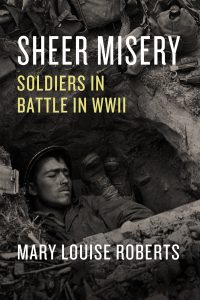Read an Excerpt from “Sheer Misery: Soldiers in Battle in WWII” by Mary Louise Roberts
The month of August marks the anniversaries of some of World War II’s most significant events, such as the Allied liberation of Paris and the bombings of Hiroshima and Nagasaki. Mary Louise Roberts’ recent book, Sheer Misery: Soldiers in Battle in WWII, differs from many traditional military histories—with their focus on battlefield maneuvers and high-level strategy—to provide an unflinching look at the experience of being a mortal body in war. Kirkus Reviews declared the book to be “a tightly focused, graphic illustration of the many ways that war is hell.” The following excerpt from Sheer Misery brings the overwhelming sensory barrage of armed combat into stark relief.

Excerpted from Chapter One, “The Senses”
The Second World War battlefield, with its massive firepower coming from all directions, did violence to the human senses. The war exposed human eyes to unknown horrors, ears to strange noises, and noses to unfamiliar odors. To British soldier G. W. Target, the mountain battles in Italy were first and foremost a crushing cacophony of sound: “The prolonged grating screamings of metal on metal or on stone, explosions, shatterings, shoutings, cryings, mechanical roarings and thunderings, convulsions, shudderings of earth or of flesh in agony, splinterings of wood or of bone, near or distant shellings, sudden crackings, gunnings, bombings, days, nights, nightmares.” Conceived by commanders as pins on a map, these battles materialized for Target as howling maelstroms of fire and death. Donald Burgett of the Eighty-Second Airborne endured the same sort of hell in the Ardennes. “All you can do is lie there and listen to the shrieking, screaming shells coming in and the loud explosions they make when they hit. Your throat dries up and your lungs burn as you breathe in the burnt powder, dust and acrid smoke caused by the blasts.”
Target and Burgett were not atypical. Infantry memoirs convey men incomparably alert to the sense-scape of the battlefield. The sound of an incoming shell, the smell of cordite and burnt powder, the sight of decaying bodies, the taste of blood—these sense memories overwhelm all others. Why do sense memories dominate infantry testimonies? Scientists believe that the human brain links perceptual and memory systems so that each triggers the other. And the high flow of adrenaline common to men in combat intensifies their sense memories. In British A. G. Herbert’s first artillery barrage, he recounted how he “leapt a foot into the air, and my heart pounded in fright, my nerves were taut because all the sounds were new at that stage.” During combat, infantrymen lived in an intensely focused present. As British Peter White put it, “Our life was occupied with the passing minute.” Brian Harpur noted, “One was conscious only of what life held for the next ten minutes or for the hour.”
Orders came down from army commanders to corps, from corps to division, from division to brigade, from brigade to battalion, from battalion to company, and from company to platoon. In this downstream current, the infantryman was, as Harpur described him, “a lonely island of uncomprehending isolation.” “Infantry,” British Rex Wingfield explained, “originally of necessity and finally from sheer habit, had the ability to look forward only to the next meal, or, at the most, to the next day.” “What was happening in the ‘bigger picture,’ ” observed White, “we could only usually sift from rumours.” “I don’t believe that there was any unit in the army that was more sheltered from the big picture as to what was happening in the war as was the Infantry platoon,” American GI Arnold Whittaker agreed; “most of the time we existed in our own little world of preservation.” GI Frank Denison admitted, “We often had no idea where we were, or what any ‘big’ plans were or why we were there.” According to one officer, French foot soldiers were doubly handicapped in knowing the operation. Not only did they see just a fraction of the front from their foxholes, but they were too tired and afraid to remember anything accurately. An infantryman’s understanding of the war extended no further than his field of vision. “You have no sense of the grander scale,” wrote Patrick Morrisey, “a soldier is only aware of what is happening in his little area. . . . He focused on the demands each day brought.” For infantrymen, the war was a series of short-term commands that more or less exhausted your body.
If sense impressions predominate in infantry memory, what can they tell us about foot soldiers and their lives on the front lines? To hear an incoming shell, to smell a buddy’s blood, or to eat frozen food for weeks at a time—these miseries have been seen as a “given” of war with no history of their own. Yet sensory meaning does have a history inasmuch as it emerges from a particular context recoverable through first-person accounts. How you heard an artillery sound, for example, depended on where you were, which way the wind was blowing, the kind of bomb coming at you, how well you had been trained, and how much time you’d spent on the line. A soldier’s senses were one of the few things he could call his own. Military life challenged a man’s personhood. Absolute obedience was the rule. A soldier had little power over his movements. Both the clothes he wore and the food he ate were issued, not chosen. Most importantly, he knew his body to be “war’s most necessary and most necessarily expendable raw material.” In all these ways, a soldier’s superiors owned him and could expose him to danger and death. His senses, however, were his alone. By making meaning of what he heard, smelled, saw, and tasted, he kept a fragile hold on his sense of self.

Mary Louise Roberts is the WARF Distinguished Lucie Aubrac Professor of History at the University of Wisconsin–Madison. She is also the Charles Boal Ewing Chair in Military History at the United States Military Academy at West Point for the 2020-21 academic year. Her most recent books are What Soldiers Do: Sex and the American GI in World War II France and D-Day through French Eyes: Normandy 1944, both published by the University of Chicago Press.
Sheer Misery is available on our website or from your favorite bookseller.